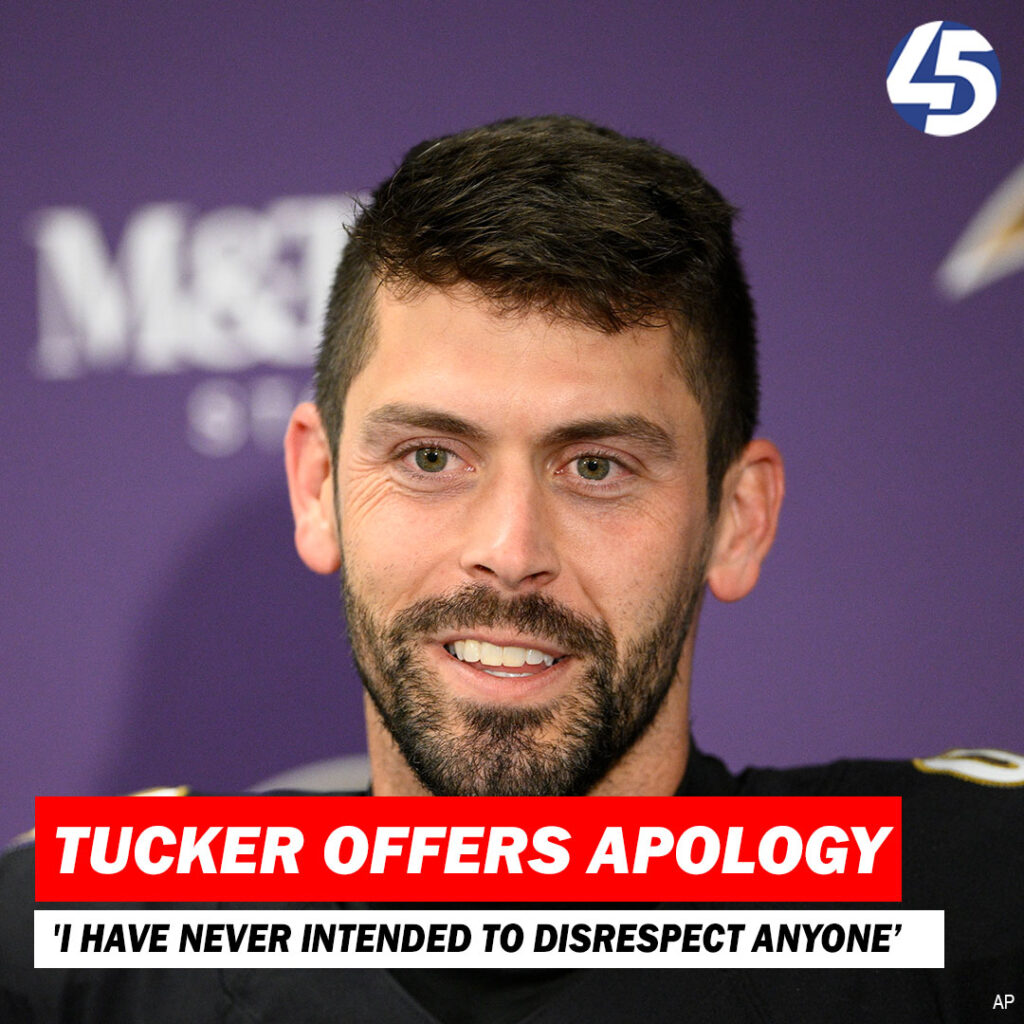
In a recent statement, Justin Tucker, a kicker for the Baltimore Ravens, insisted that he did not behave inappropriately while undergoing professional bodywork treatment.
In the world of professional sports, athletes are often subject to intense scrutiny, both on and off the field. Recently, Baltimore Ravens kicker Justin Tucker found himself in the midst of a controversy, not due to a missed field goal or a game-changing play, but due to allegations about his behavior during a professional bodywork session. The claims, though serious, were met with a firm and public response from Tucker himself, who insisted that he did nothing inappropriate during the treatment.
This article aims to explore the incident in question, examine the nature of the allegations, and provide a comprehensive analysis of Justin Tucker’s response. Furthermore, we will delve into the broader implications of such controversies for athletes and discuss how public figures navigate personal challenges while maintaining their professional integrity.
The controversy began when an individual, whose identity has been kept private, came forward with claims about Tucker’s behavior during a bodywork session. According to the accuser, Tucker allegedly crossed professional boundaries during a routine treatment meant to address physical stress and muscle tightness. The nature of these allegations, though not explicitly detailed, raised concerns about the ethics of bodywork treatment in professional sports.
Bodywork, which includes practices like massage therapy, chiropractic care, and other forms of physical treatment, is a standard part of an athlete’s regimen to ensure their body remains in peak condition. For professional athletes like Tucker, who put immense stress on their bodies throughout the NFL season, maintaining physical well-being is critical to longevity and performance. However, the intimate nature of these treatments, particularly when deep tissue work is involved, has the potential to lead to misunderstandings or misinterpretations.
The incident reportedly occurred at a privately scheduled session with a certified bodyworker. Tucker, who has long been known for his professionalism and work ethic, did not anticipate that his session would spark a public controversy. According to reports, the bodyworker raised concerns after the treatment, and the situation was escalated without Tucker’s knowledge.
Upon hearing about the allegations, Justin Tucker immediately issued a statement through his representatives to address the matter publicly. In his statement, Tucker denied all accusations of inappropriate behavior and stressed that his actions during the bodywork session were entirely professional. He expressed disbelief at the accusations and emphasized his commitment to respecting all individuals, particularly those in professional settings.
“I want to make it clear that I did not behave inappropriately at any point during the treatment session,” Tucker said. “I have the utmost respect for everyone I work with, especially those who help me maintain my health and performance. I would never compromise the professional integrity of those relationships, and I am deeply disappointed that such an allegation has been made.”
Tucker’s swift and clear denial was intended to quell any doubts or misconceptions that might arise from the situation. In the highly publicized world of professional sports, an athlete’s reputation is invaluable, and Tucker’s proactive approach to addressing the claims was a deliberate step toward defending his character. By issuing the statement, he sought to maintain control over the narrative and prevent the situation from escalating further.
To understand the context of the incident, it’s essential to recognize the role that bodywork plays in an athlete’s career. Professional athletes subject their bodies to extreme physical demands, whether through contact, endurance training, or sheer intensity. Kicking a football with the precision and power that Tucker does requires not only a strong leg but also a finely tuned body that can withstand the stresses of repeated high-intensity motion.
For Tucker, bodywork treatments have long been part of his training and recovery routine. Massage therapy, stretching, and chiropractic adjustments are all tools used by athletes to address muscle strain, maintain flexibility, and recover from injuries. These treatments are generally performed by licensed professionals who understand the unique needs of athletes and are trained to provide care in ways that ensure both efficacy and safety.
However, given the highly physical and sometimes intimate nature of these treatments, boundaries must be respected by all parties involved. Athletes, especially those with celebrity status, are often in positions where their interactions with support staff can be misinterpreted, which is why clear communication and professionalism are critical in maintaining a positive and respectful working relationship.
The accusation against Tucker, though ultimately unproven, carries with it serious risks. Public allegations of misconduct, particularly those involving allegations of inappropriate behavior, can tarnish an athlete’s reputation, regardless of the outcome. In the case of Justin Tucker, his impeccable record as an athlete, leader, and individual was called into question due to an allegation that, on its face, seemed incongruent with the public image he had built over years of dedication and success.
Athletes are often held to a higher standard because they serve as role models to millions of fans. When accusations arise, the public’s response can be swift, and in some cases, damaging. Even the most minimal association with allegations of misconduct can lead to a loss of endorsements, sponsorships, and public support. It is a delicate situation for anyone involved, but for Tucker, who has long been regarded as one of the most respected players in the NFL, the stakes were higher.
For many athletes, the specter of public accusations can impact not only their personal reputation but also their professional relationships. Sponsors, teammates, and other organizations may distance themselves from an athlete caught up in controversy, regardless of the veracity of the claims. Thus, athletes like Tucker must be prepared to defend themselves rigorously while maintaining their composure and professionalism in the face of public scrutiny.
Tucker’s swift response to the allegations highlights the role of public relations (PR) in crisis management for high-profile individuals. In today’s media-driven environment, athletes must often rely on their PR teams to help them navigate complex situations. Tucker’s statement was likely crafted with input from public relations professionals, who understand the importance of addressing accusations quickly and effectively.
A well-crafted PR response can go a long way in helping an athlete control the narrative and prevent long-term damage to their reputation. By being transparent and clear in his denial, Tucker made it clear that he was taking the matter seriously but also asserting his innocence. A delay in responding or an overly defensive posture could have been interpreted as an attempt to cover up the truth, further complicating the situation.
In this case, Tucker’s proactive statement allowed him to present his side of the story early in the process, reducing the likelihood that misinformation would spread. This approach helped to protect his reputation while providing the public with a clear account of his perspective.
While Justin Tucker’s statement was an important part of managing the situation publicly, the legal implications of the allegations also deserve attention. In cases of alleged misconduct, both the athlete and the professional involved must consider the legal ramifications of their actions.
Tucker has indicated that he intends to cooperate fully with any investigation, should one occur, and his legal team will likely be involved in ensuring that the facts are accurately presented. The bodyworker, as well, must consider the potential legal consequences of making accusations that could harm an athlete’s career without sufficient evidence to back them up.
In a professional setting, the importance of establishing and respecting boundaries cannot be overstated. For bodyworkers and athletes alike, the relationship is built on trust and professionalism. Any violation of these boundaries can lead to significant consequences for both parties, including damage to professional reputations and legal action. Therefore, it is imperative that both the athlete and the service provider are aware of and respect the personal and professional limits set forth in their respective roles.
As the controversy surrounding Justin Tucker’s bodywork treatment unfolds, the key to resolving the situation lies in maintaining trust and professionalism. Tucker’s denial of the allegations, coupled with his willingness to address the matter publicly, sets a strong precedent for how athletes should respond when faced with accusations that threaten their reputation.
Moving forward, it will be essential for all parties involved to communicate openly and clearly. While the details of the situation may remain private, transparency in handling such matters can help ensure that trust is maintained between athletes, support staff, and the public. By fostering an environment of professionalism, both athletes and those who support them can continue to work together to achieve the highest level of performance while safeguarding their integrity.
For Tucker, this incident serves as a reminder of the scrutiny that public figures face and the importance of navigating professional relationships with care. With his career still in its prime, Tucker’s reputation as one of the NFL’s best kickers remains intact—assuming the truth of his statement remains clear to all who are watching.
In the end, Justin Tucker’s response to the allegations illustrates the balance athletes must strike between defending their character and ensuring that their personal lives are respected in an ever-judgmental public space. The outcome of this situation will likely have lasting effects on how professional bodywork is perceived and the measures taken to preserve the trust between athletes and their support teams.





